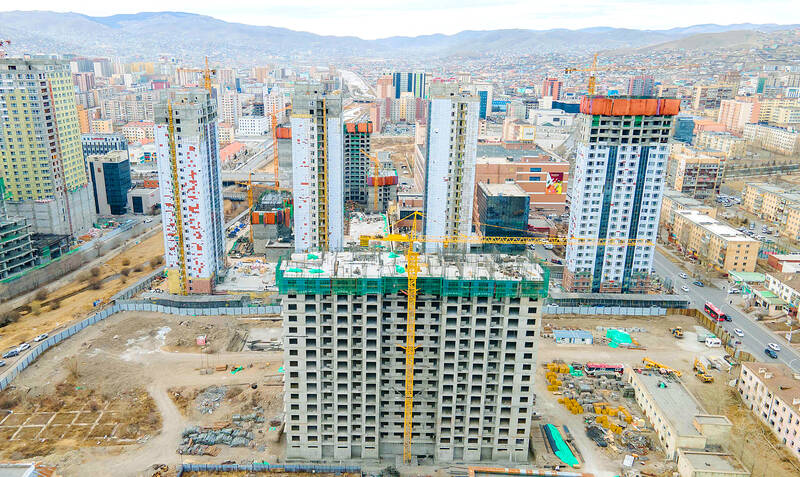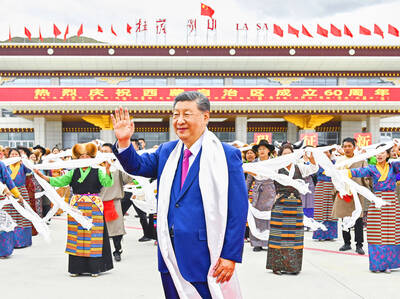Otgoo recalls running around freely as a child in Mongolia’s once sparsely populated capital city, but he fears a rapid construction boom has now trapped his children in a concrete jungle.
Across Ulan Bator, high-rise buildings are replacing the yurts that Mongolians have for centuries called home, symbols of a nomadic life that is fading away.
Locals say that the construction boom — fueled by a decade-long mining windfall — is squeezing out room for much-needed public services, from new hospitals to children’s playgrounds.

Photo: AFP
“When I was a child, I spent all day outside,” said Otgoo, who only gave one name. “We used to play soccer, running like a wolf or rabbit in big empty spaces.”
“My kids can’t run like us. All places are filled with new apartment buildings,” he said.
Mongolia’s mining boom drove double-digit growth, with profit from coal business making up one-quarter of the country’s GDP last year.
The industry has sparked a wave of demand for office space and luxury apartments in Ulan Bator.
The haphazard and rapid mushrooming of the capital — its population growing from 500,000 in the 1990s to about 2 million last year — has also led to massive daily traffic jams, trapping people in often hours-long commutes to and from work.
However, the boom has largely not included vital civic infrastructure, leaving many children growing up without outdoor recreational facilities, parents told reporters.
There is little room for bigger playgrounds, schools and hospitals, many of which were built under communist rule more than 30 years ago.
“My kids’ only chance to play outside is on the weekend,” said Ulzii, a mother of three. “They stay home and watch screens.”
Just a stone’s throw from parliament, the Shangri-La hotel — which boasts impressive views and hundreds of rooms priced well out of reach of the average Mongolian — was built on land once intended to be occupied by a children’s amusement park.
Existing civic services such as schools and kindergartens are stretched to their limit, with an average of 50 to 60 children crowding into each classroom. Experts blame antiquated city planning strategies for the poor management of public spaces.
“There were urban plans before the boom, but they weren’t smart,” said Anu-Ujin Lkhagvasuren, an urban governance expert. “Places once meant to build garbage dumps have now turned into the most expensive residential areas.”
Ulan Bator “basically copied” Soviet-style plans that placed workspaces far from residential districts, she said.
The policy was meant, in part, to pull working-class people out of inner-city slums and into better-managed suburban communities, she said.
“Workplaces are now centered around the main square and that causes traffic jams,” she added.
Some are pushing back. In the face of protests, the city’s mayor in 2021 announced a ban on construction permits for new buildings, with the exception of schools, until 2040.
However, the ban does not cover already approved projects, meaning construction crews are still hard at work all over the city.
“When the country became democratic in 1990, Mongolians traveled abroad and when they saw megacities like New York or Singapore, they wanted shiny skyscrapers and built the same ones here,” said Achit-Erdene Darambazar, an investment banker.
In a country where poverty remains stagnant, some believe the construction boom is emblematic of larger issues — specifically alleged corruption by public officials.
“We’re asking each other: ‘Where did the mining export income go?’” Achit-Erdene said. “The answer is the construction boom.”
Last year, the chief executive officer of a large state-owned coal export company was placed under investigation for embezzlement, with the country’s anti-corruption authority saying many of the looted funds went into real estate.
“Corrupt officials buy apartments instead of holding cash in their account or in their home,” said Battsetseg Dorjlkhagva, a councilor representing Bayanzurkh, one of the Mongolian capital’s largest districts. “We live in such a little space that it can be difficult to pass one another at times.”
Battsetseg led protests for a year against a high-rise office project, ultimately leading to the works being canceled. Now, a kindergarten is being built in its place.
“We don’t need tall buildings anymore,” she said. “If there is any unused land, it should be used for the benefit of the people.”

Ten cheetah cubs held in captivity since birth and destined for international wildlife trade markets have been rescued in Somaliland, a breakaway region of Somalia. They were all in stable condition despite all of them having been undernourished and limping due to being tied in captivity for months, said Laurie Marker, founder of the Cheetah Conservation Fund, which is caring for the cubs. One eight-month-old cub was unable to walk after been tied up for six months, while a five-month-old was “very malnourished [a bag of bones], with sores all over her body and full of botfly maggots which are under the

BRUSHED OFF: An ambassador to Australia previously said that Beijing does not see a reason to apologize for its naval exercises and military maneuvers in international areas China set off alarm bells in New Zealand when it dispatched powerful warships on unprecedented missions in the South Pacific without explanation, military documents showed. Beijing has spent years expanding its reach in the southern Pacific Ocean, courting island nations with new hospitals, freshly paved roads and generous offers of climate aid. However, these diplomatic efforts have increasingly been accompanied by more overt displays of military power. Three Chinese warships sailed the Tasman Sea between Australia and New Zealand in February, the first time such a task group had been sighted in those waters. “We have never seen vessels with this capability

A Japanese city would urge all smartphone users to limit screen time to two hours a day outside work or school under a proposed ordinance that includes no penalties. The limit — which would be recommended for all residents in Toyoake City — would not be binding and there would be no penalties incurred for higher usage, the draft ordinance showed. The proposal aims “to prevent excessive use of devices causing physical and mental health issues... including sleep problems,” Mayor Masafumi Koki said yesterday. The draft urges elementary-school students to avoid smartphones after 9pm, and junior-high students and older are advised not

Chinese President Xi Jinping (習近平) attended a grand ceremony in Lhasa yesterday during a rare visit to Tibet, where he urged “ethnic unity and religious harmony” in a region where China is accused of human rights abuses. The vast high-altitude area on the country’s western edge, established as an autonomous region in 1965 — six years after the 14th Dalai Lama fled into exile — was once a hotbed for protest against Chinese Communist Party rule. Rights groups accuse Beijing’s leaders of suppressing Tibetan culture and imposing massive surveillance, although authorities claim their policies have fostered stability and rapid economic development in